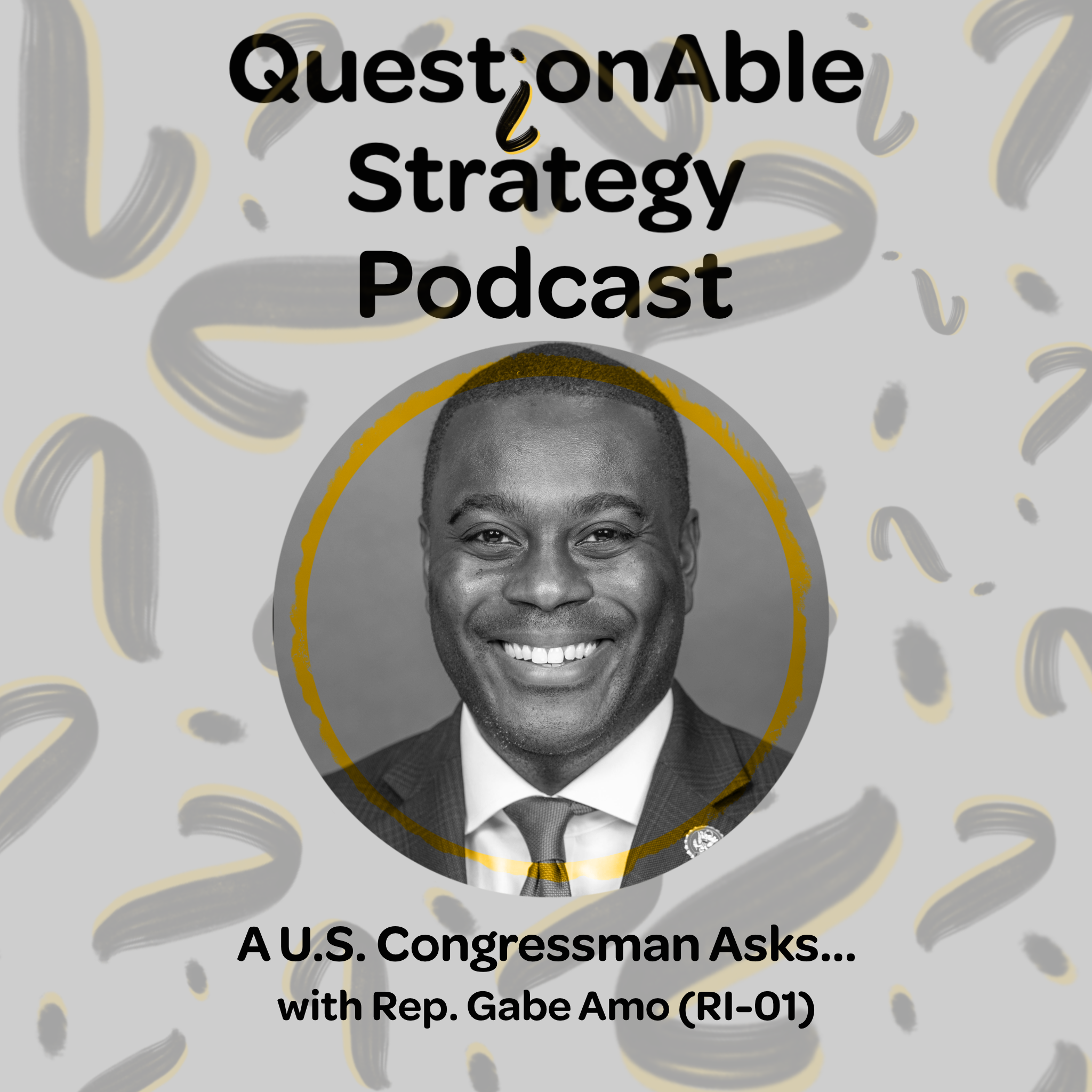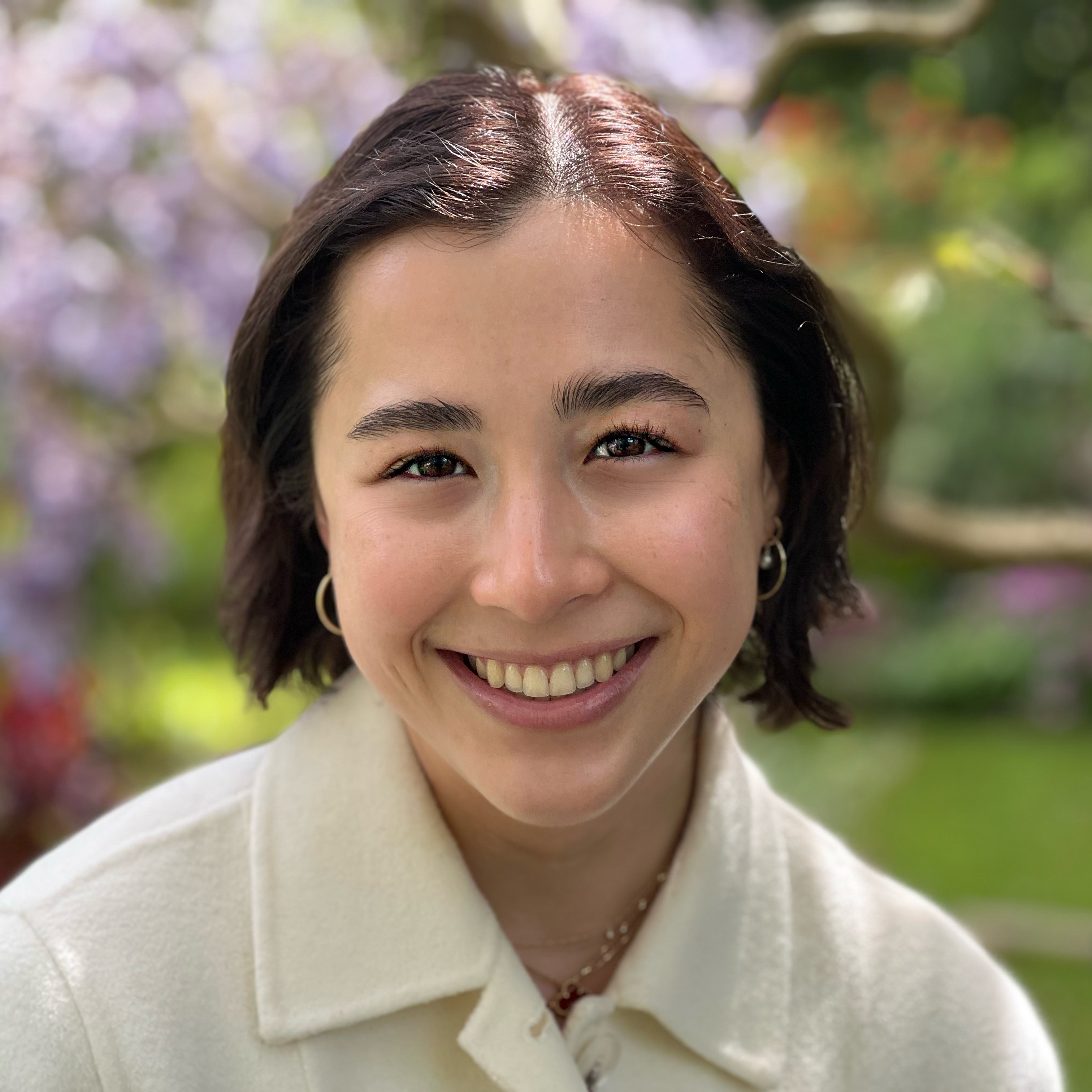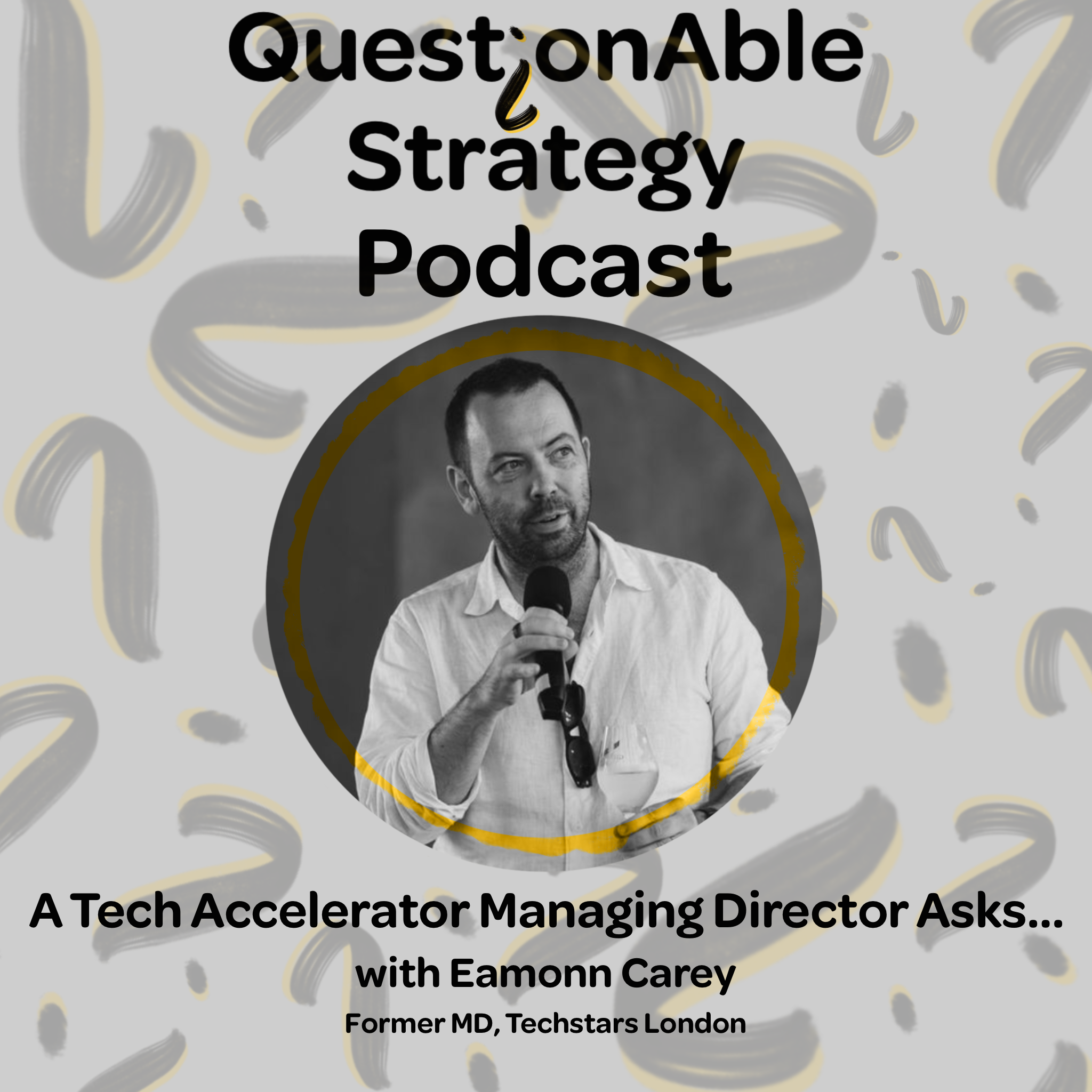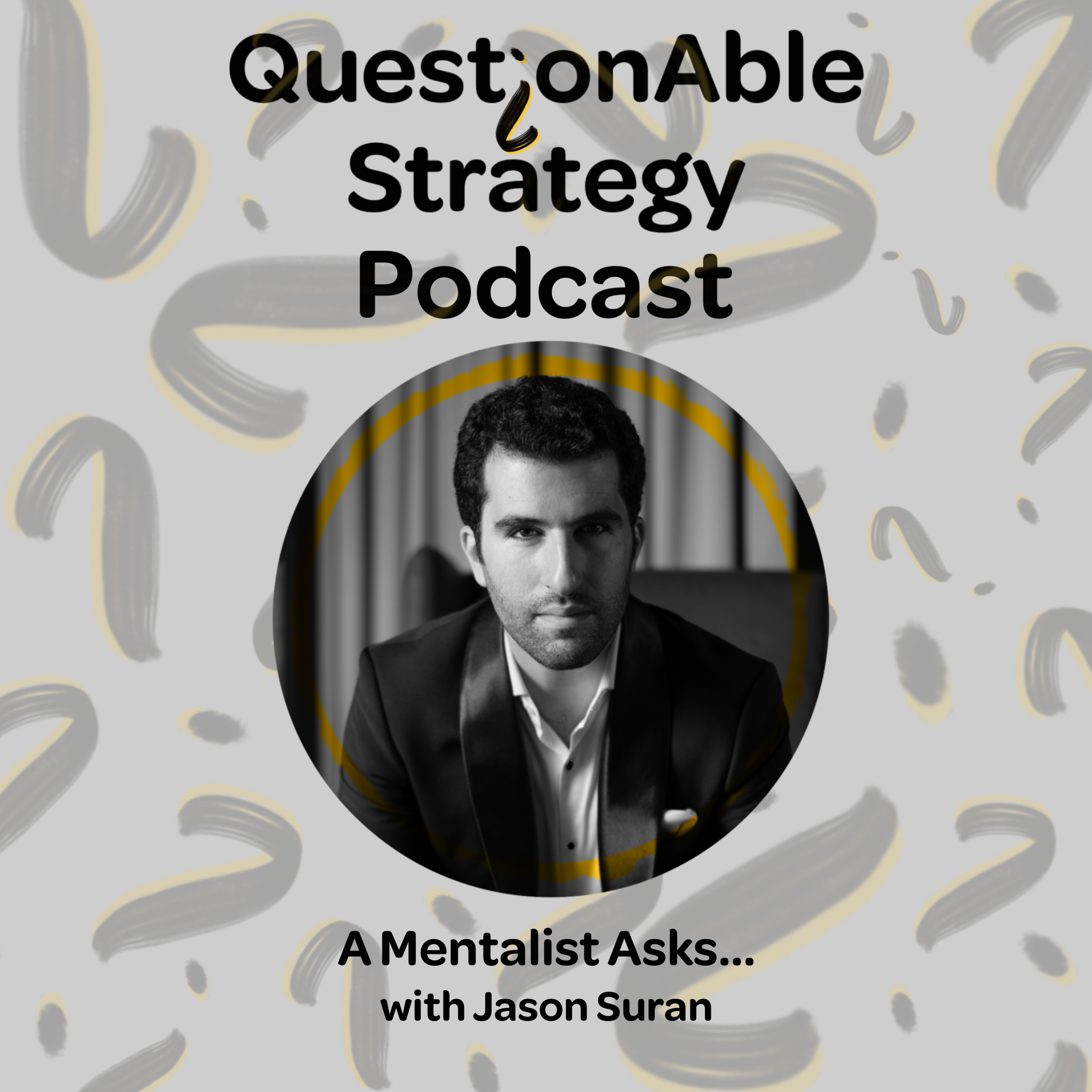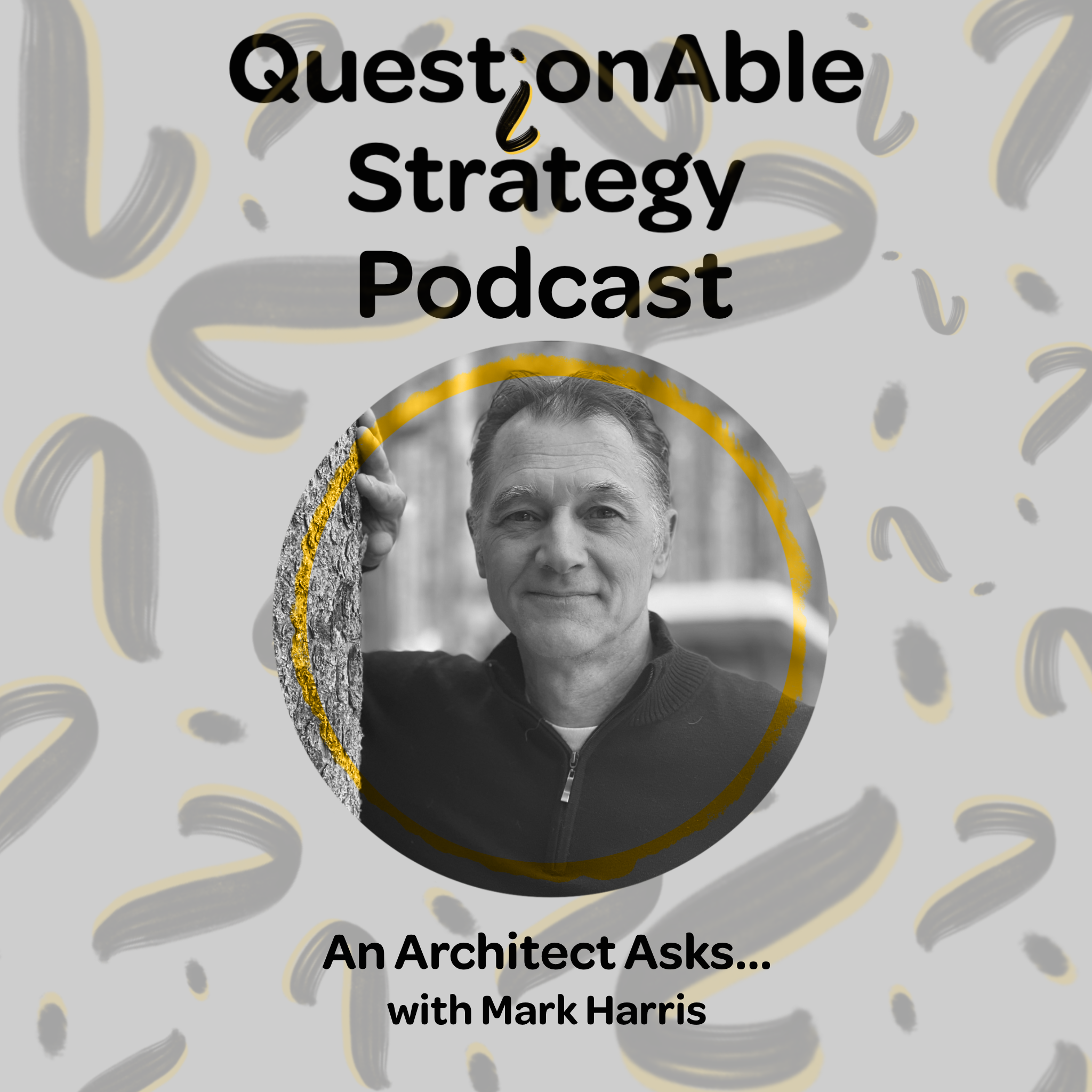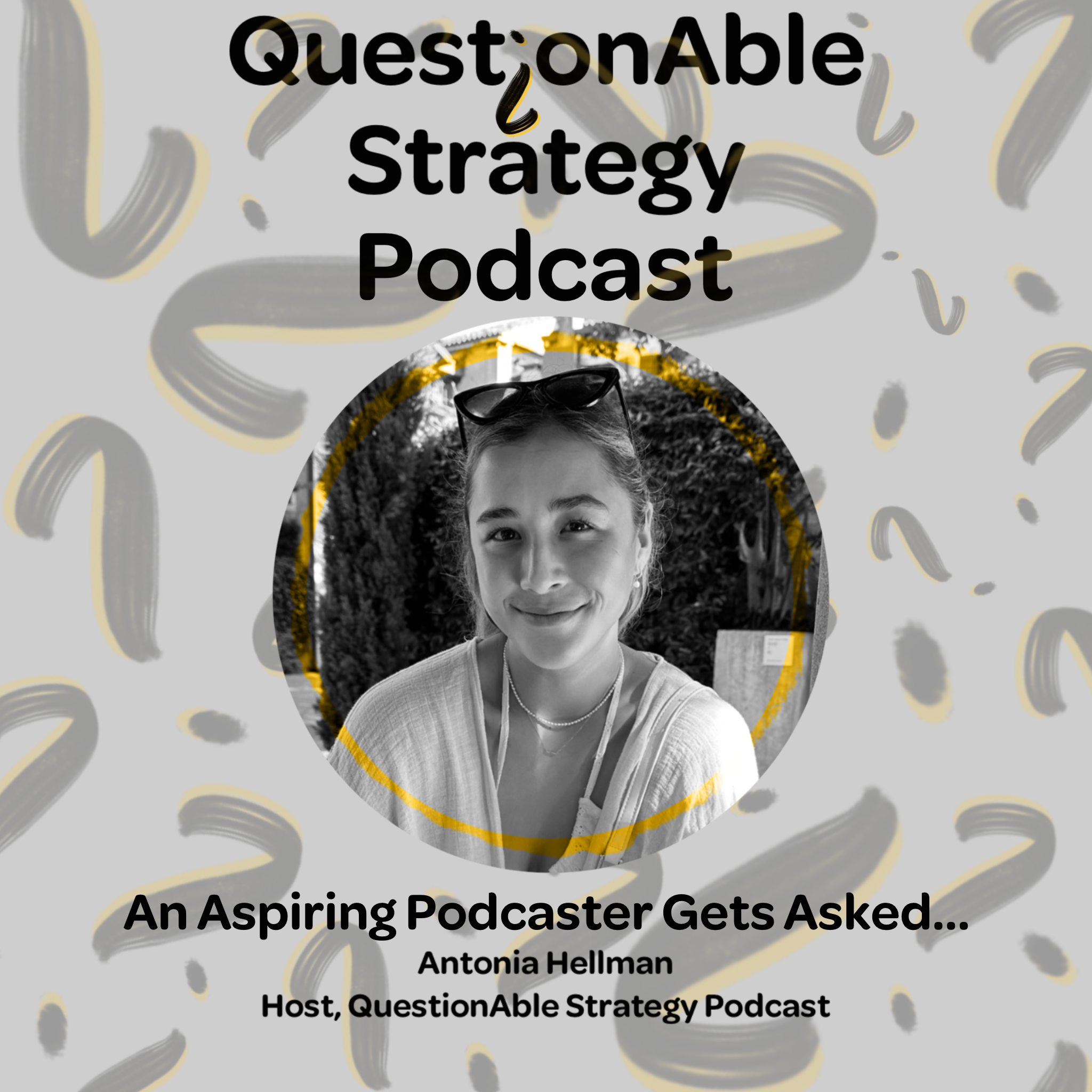Episode Transcript
Why elections are so important is because they are, in fact to me, job interview processes. It's about people looking at your credentials, they look at your resume. They interview you via debates, via knocking on their door, talking to them at events. And they're evaluating whether you can act on their behalf in a way that accords with the trust that they're going to put in you. Hey everyone, it's Antonia back with another episode of QuestionAble Strategy. And the voice you just heard was Congressman Gabe Amo, who represents Rhode Island's 1st Congressional District. Congressman Amo was elected to Congress in 2023, in a special election when he was just 35 years old. And for anyone who might not know, a special election happens, in this case, when the incumbent, who's the sitting congressman in that district, steps down in the middle of their term, resulting in an off year election. So usually elections for Congress happen on even years, and in this case it happened in an odd year. But a little bit more on Congressman Amo, his entire career has been in public service. Prior to running for Congress, he worked in the Biden Administration in the White House Office for Intergovernmental Affairs. And before that, he worked in the Obama White House and for Rhode Island Governor Gina Raimondo. I feel so special and honored to have gotten the chance to speak with a sitting U. S. congressman. And if you were wondering, the timing of the release of this episode is especially important and entirely deliberate. The US election is right around the corner. It's happening on Tuesday, November 5th, and I really want to take this opportunity to encourage everybody listening right now to make a plan to vote if you're eligible to do so. This is such a critical election and the power to vote for our elected leaders is not something that should be taken for granted. Now, without t further ado, this is how a U. S. congressman asks questions with Congressman Gabe Amo. Congressman Amo, welcome to QuestionAble Strategy. It's really nice to have you. Thanks for having me, Antonia. My first question for you is, who inspired you to be curious? I think curiosity is less about who inspires you than what inspires you. Often, people have figures, but I think you find your spark, right? You find what drives you. Often it's an attribute that you see reflected in a person. Sometimes it's aspirational. Like you look at somebody and say, "wow, one day, I want to be that person." You see an issue that just burns in your belly, and you're excited about it or you're distressed by it, or you're compelled to dive in deeper. And so curiosity for me is bred from a feeling that you need to not only solve for something, but you need to go down that road. It's a Robert Frost, right? You know, two roads diverged a yellow wood and you pick the one that made all the difference. That's what curiosity does. We have those inflection points all the time. And my sense is over my life, it's been a wide range of people, but they've all given me a burning desire to learn more. Tell me, who was somebody when you were a little kid that you looked up to and said, I want to be like them? I think, when you're a kid, and it, depends what part of your childhood, right? Because we all go through the firefighter, athlete, teacher phase, right? Like All the adult figures in your life that look like they're doing something that's really important. And especially around helping, because I do think, when we are younger, the helping fields seem to be really attractive, right? It's what we model and practice with children in elementary school about sharing and leadership and order and staying in line and all those things. But for me, I think about when I was young. Oddly, I consumed a lot of news media because I spent my Sundays with my dad and he would watch CNN's headline news and like I'd see multiple editions of the news over and over. And then I also remember when I was five, it was 25th anniversary Dr. King's assassination. which is wild to think about because it seems like it was ancient history. But in 1993 when I was in kindergarten, there was a lot on the news about it. And was interesting to me, like, why do people care about this person? And you hear about the message of equality. And for me, being a black kid in Rhode Island where there's not a lot like you, you sort of are attracted to a message like that even though it seems so beyond you, but you can, simplify it, right? In the "I Have a Dream" speech, in that closing portion when he talks about black kids and white kids, you're like, "oh yeah, it makes sense to me." So I think there are instances like that, but certainly my consumption of the news, my consumption of the history that I saw early was inspirational in lots of ways. But I've also loved all of the authority figures, the cops, the firefighters, the teachers, because I felt they were focused on keeping me safe. And safety is something that I think you pursue at a young age. In a similar vein of inspirations, when you're young, you were really young yourself when you worked in the Obama White House. And I'm curious to know more about how a young person in that kind of environment asks questions and goes about learning, when oftentimes young people feel like there's a lot of pressure to already have the answers. Yeah, no, that's such a great observation, right? The pressure to know the answers, I think is one that I've certainly felt, but I've rejected a lot of my life. I learned through observation. That is something that people who know me will identify. When I'm delving into a topic, I don't, I'm not rapid fire with the questions. In fact, I like to sit back and let people talk, get a situational awareness to the fullest extent possible, know as much as I need to know before I contribute. Because there are many ways to contribute. I just know that I like to draw and put different strands together. And why I illuminate that sort of approach is throughout my career, I've always been amongst the youngest around. The first campaign that I worked on as a full time organizer, I was 18 years old. I could not legally go to the bar with the other organizers after a shift of knocking on doors or phone banking or organizing volunteers. That was before I went to college. Similar when I got to the Obama White House after working on the president's reelection campaign in Chicago, when I got there in 2013, you actually have a whole cadre of younger staff people with you. And in that cohort, you have an opportunity to work closely with each other in understanding how to navigate this place. The challenge that a lot of young people face and people at the beginning in any organization is forgetting that building allyship with others, amassing knowledge through collecting the observations of other people, having people who you can pick up the phone and call or do walk and talk with. That's how you amass, not just knowledge, but an ability to act on issues and agency. And moreover, it makes you go back to a word that I used before, a little more safe and comfortable in putting yourself forward, in accomplishing tasks. And so, you know, when I, look at that, pressure to contribute, there are ways to lessen that load by distributing and making sure that you are, fortifying yourself, with a lot of both the people, and the experiences so that you are acting in a way that is meaningful and actually gives you greater chance of making impact. You mentioned preparation, so making sure that you know as much as you can before you go into a situation, which I'm sure has carried on into your time in Congress. What role do you think preparation has, when it comes to asking great questions? It's everything. I honestly, I have a difficult time when folks aren't informed, haven't, read the briefings, consumed the news. Some of my early jobs, I was rewarded for just being nimble on a range of subject matter. In fact, I think that one of the reasons I'm able to serve in Congress now and was able to run a decent campaign is my comfort level talking about a lot of different things. That's not saying that we all have to be an encyclopedia. But I think about a job that I had in the 2012 campaign, working on the national political team. And just knowing and spending my time consuming news clips from across the country about the political races, about the players, so that my boss might not know the answer to something, I could slip that something on a piece of paper or I could chime up and say, "yes, this is what's happening in Ohio's eighth congressional district. This is what's happening in the North Carolina governor's race. Here are the players." And similarly on the big issues of the day that I have to work on. We have some of the greatest threats, but some of the greatest opportunities for the next century right in front of us. Whether we're talking about artificial intelligence or whether we're talking about how we're combating climate change and everything in between. I love the people who work with me, the staff that I've assembled to serve the First Congressional District of Rhode Island, but they're only as helpful to me as I'm able to absorb and consume on my own and in partnership with them so that, as I take their perspectives, as I take the perspectives of my constituents, as I learned from committee staff, and I learned from other members, I'm going in with opinions that aren't just about voting yay or nay, but have nuance to help us address in the long term the types of issues that are going to be evolving. And that constant state of needing to shift analysis on a given day requires deep preparation. Some days I have meetings with ambassadors, parliamentary members from Eastern Europe to meeting with your local advocates on cancer or leukemia or sickle cell. To having conversations with folks about energy and energy policy and what we do. And so the thing that allows me to be a meaningful participant is preparation. I have a lot of listeners who are young people who are just starting out in their careers. They're a little bit anxious about what that means. And we mentioned the pressure to always feel like you know the answer. That kind of preparation. You'd think that it would actually make somebody feel anxious. If they're used to being so prepared, and they find themselves in a position where they are not adequately prepared, or they don't know something, they start to panic. Do you ever have that kind of feeling, what do you do? Yeah. I know that I'm going to have a ton of blind spots and miss things. And so the response to that isn't to overcompensate by talking more. It's actually by saying less. I had the opportunity, for high school I went to a Quaker school, and I have a great appreciation for silence. And not just because I don't want to say anything or don't have anything to say, it's because when you can find that in your space, wherever you are, to reset, to determine what are the goals? Sometimes we reward and we've seen this, and there's a negative sort of incentive structure that a lot of us who have gone to great schools and been in settings like, we get rewarded for coming up with something clever on our feet. And sometimes it's intimidating when you've seen people get rewarded for that a lot of their lives and you just actually don't feel that's the right approach to take. Not every one of us is going to be expert at extemporaneous parliamentary debate. There's a time and a place for that. When we enter these workplaces, when we enter these settings, where people put us in positions because they know our potential, that should not create pressure. Instead, it should drive us to want to achieve a greater level of thoughtfulness. And know that someone believed in you. You don't necessarily have the ability to demonstrate your whole capacity and potential in those moments. They know that something is there. And that alone should be comforting, provide some level of safety. And enable us. To be thoughtful, to be methodical, to approach the task, the challenge the roles that we have in a way that is less about pressure and more about making yourself the best version of yourself possible to whomever the audience is. I love the emphasis on different personality types, and it just goes to show that you can be a great question asker, you can be a great public figure, you can be great at any job regardless of what kind of personality you have. And again, that emphasis on safety comes up again. What do you do on the campaign trail? What kinds of questions do you ask voters in order to get them to trust you? This is an evolving challenge for me because trust is what underlies the entire system, right? A democracy functions because of this social contract, where I buy in, I pay my taxes, I vote for you. I maintain the structure in return for an agreement that you, the broad capital Y, You, will fight for and support us to reach our highest potential, to meet the minimum needs and requirements of our society. And that will provide a feedback loop that keeps the whole thing running. But underlying the whole thing is trust. Each side has to do its own thing, right? We have challenges to our democracy, a January 6th, for example, Why that brings up the issues of trust, people didn't trust the system would, work for them, and they were, in fact, willing to change the system forcefully in a negative way that then does not accord with the commitment to keep that going on the other side of the ledger, right? If you destroy the trust that's based in our democracy and destroy the underpinnings of it, then you can't do anything. So it goes to those big ideas of January 6th, but it also then goes to an individual interaction. When I am asking for someone to be their vote in Congress, there are arguments on whether we are a "delegate system" where I am merely a vote for all those people back home in the district, the 550, 000 of them, or it's a "trustee system," where they sort of, defer to my best judgment, but they get to vote for me one time every two years. And so that a debate and I, it's one that I struggle with. Because oftentimes you will find yourself in a situation where you don't know exactly what everybody back home thinks the best thing is. In fact, that happens all the time, but you have to use your best judgment. And why elections are so important is because they are, in fact to me, job interview processes. It's about people looking at your credentials, they look at your resume. They interview you via debates, via knocking on their door, talking to them at events. And they're evaluating whether you can act on their behalf in a way that accords with the trust that they're going to put in you. And so for me, I say past is prologue in many ways. I have been working at the heights of government for a long time. I also say, we're connected in this." My interest is their interest. I often talk about a Rhode Island story. It's an American story of where we all are connected by someone before us exhibiting a great amount of hard work, resilience, determination to make our tomorrows better than today. And how we are connected through that is the system of values that I put forward in the work is that I won't forget about you because we are in this together. And then, ultimately, you have to be future oriented. And that's where you talk about the issues, that's where you talk about the ideas, and that's where you talk about that system of trust that creates the feedback loop for us to keep our democracy going. That you can trust that I want to make your life better. I want to make your experience in this country the heights of its potential, but also that we satisfy the bare minimum of keeping your roads functioning, your waters clean, your elections safe and protected, and all of the things in between. What are methods that you've employed and questions that you've asked that have helped you connect with other representatives with whom you disagree politically? I think that's a great question. I always try to understand where people are coming from. We have 435 districts and they all look different, right? I have many colleges and universities in my district. I have rural, I have a coastline. I have old industrial New England in my district. It looks vastly different than districts in Alabama or Wisconsin or Wyoming or Texas. And so you first have to understand who are people representing? If it goes back to that question of the delegate versus trustee system, ultimately, there's an accountability. You have to be elected and you have to see people in your districts at the supermarket at church or synagogue, at the various social functions that are out there. You also need to know who is that member going back home to? So it's not just where they are, but who are they having to be responsive to? And then also understanding people's life experiences. Now, I don't think that often will justify things that I disagree with. I believe in reproductive freedom. There is no background I think that accords with saying that's okay to threaten it. I understand why someone might feel that way. It's never a justification, but in order to understand where people are coming from, you figure out where they are. And then, the range of their life experiences, but also what they care about. You often will find, I think take the issue of rare diseases, that somebody will have somebody in their life, family member, constituent that motivated them to run for office, to be an advocate on an issue. It's always good to get to that because it is not only about how you approach people and how you break the walls down, but you understand a little bit more about their motivation. And I will say one of the more powerful things that I've experienced in any setting is knowing someone's why. Because you can relate to them in a much different and much more fulfilling and deeper way. Can you tell me about the context in which you would have a conversation like that, where someone's genuine why would come out? I think we have that often when it relates to issues around whether it's social programs in particular, whether it's issues related to international topics, for example. I was with a colleague who was from South Florida, as a strong Haitian population. Herself, her family is from Haiti. And we talked about the history of the country and why compelling US action to help resolve the issues meant so much to her. Understanding that she did not feel like she was just a member of Congress for that district, but also for the Haitian Americans across America, who are calling and seeking assistance. You see that on issues. I've, I've talked to members who have folks with developmental disabilities in their families. And these are people sometimes who hate all federal government spending, but they do want it in this particular area. And that drives them. And it's not for me to judge. Everybody, again, is going to be driven by something in particular. And one, you can approach someone on another issue and say I know how you feel about this issue. Let me talk to you about something that's important to me. And sometimes folks are willing to vote because they trust, Again, back to the theme, the intentions and the judgment of their colleagues to be as well intentioned as their motivation for what they do on other issues. I think that it's definitely a lot harder to hate someone when you've spoken to them face to face. And there's a lot of antagonism right now in the world, but I'm sure that you've experienced things in Congress where you've disagreed with somebody fundamentally and thought, "Oh, maybe those ideas might make them a bad person" and come out of the interaction thinking, "no, that person's actually not a bad person. It's not so black and white. When you're thinking about running for Congress, a lot of people reflect and they think "why me?" What kinds of questions did you ask yourself, when you were deciding to launch your campaign for the special election in 2023? I think it was four questions that I asked myself: one, did I feel ready? Did I feel like if elected I could do the job? Two, how's my family doing? How's everybody else in my life? How are they going to be affected by it? If I felt like it wasn't going to be too burdensome to other people in my life that I do it. Three, was there anybody better? You also have to exhibit some level of humility and say, "I might be good, but someone else might be better." And four is you have to answer yes to this one is can you win? And you have to take that approach to everything in your life. Yeah, it has to be, "I can win this." And if you can't be confident in that, no matter what the odds are against you, it might be really tough to accomplish your goals. It starts with you. I love that set of questions so much. I think it really extends, as you said, to all different professions, not just campaigning. My last question for you is, what is one question that you like to work into a conversation, whether at work or in a social setting or even on a campaign, that really helps you get to know someone? I usually love having the opportunity to to ask people how they got to where they are. And oftentimes people take it literally and just go to their resume. But I always encourage people, and usually it's people I've seen before, I say, "I already know X, Y, and Z about you. I've read your website. I've seen your resume. How'd you get to where you are today?" And it's always interesting to see where people land in that particular question and what they think and how they understand where they are today. And that can be mentally, that could be professionally, that could be financially, wherever that is. I think that is often quite revealing. Have you ever asked that question, and somebody said, "Oh, I took the Metro."? Yes, 100%. And that's an okay answer. That's an okay answer because that's where their mindset is, right? And it's about knowing where you fit, what part of your story is important. Because how you got there on the Metro might explain a whole lot about you. That's the perfect note to end on. Thank you so much. Congressman Gabe Amo for coming on QuestionAble Strategy. This has been a delight. Thank you for having me on, and look forward to hopefully meeting you at some point soon. Oh my gosh, I cannot get over how cool that was. It really isn't every day that you get to talk with a congressman about the path and the mindset that got him where he is today. As well as the questions that he asks on a daily basis. I mean, in particular, I was really interested to hear him talk about the questions that can be used as tools to collaborate across party lines. I, just like many or most of you, don't know exactly what happens inside the US Capitol and I'm kind of forced by what I see on the news to believe that all politicians are incredibly gridlocked and uncooperative, frankly. So, hearing him talk about his colleagues actually gave me a glimmer of hope for collaboration among elected officials in the future. Hopefully Congressman Amo continues to set a good example and ask meaningful questions. The question he left us with at the end of our conversation was How did you get here?" I love how open ended this question is and it can be interpreted in so many different ways. And I can actually see it being used in such a wide variety of settings, whether it's asking it casually to a friend or you'd even ask it to your boss or a professional mentor. Or you could always bring it up when you're chatting with a stranger. And that's actually what I did. So I used this question in a conversation with an Uber driver in London. When I hopped in the car, my driver was really excited because he'd seen my name, and he assumed that I spoke Spanish, which with the name Antonia happens to me all the time. And luckily I spent seven years in school studying Spanish. So I get into the car and he immediately starts chatting with me in Spanish. We talked about life and what had brought me to London from the States. And then I had the perfect opportunity to ask him, "how did you get here?" This question opened up such a fantastic discussion because my driver shared with me that he'd studied economics in Spain, but felt restricted by job opportunities back home. And so he decided to move to London to start taking courses in programming and cyber security. And he was in the process of earning several different certificates that would allow him to pursue a more fulfilling career. So because of just this one question, I learned tons about his motivation, about his educational background, about his home country, about what his dreams were, his aspirations for himself, and how much of a self starter he is in completely picking up, moving to a different country, and studying an entirely different field from scratch. One small consideration that I think I should add here is the importance of tone So in English or in Spanish, When you're asking a question like, "how did you get here?" You want to make sure that the tone of your question and the context makes it clear that you're asking somebody about their life path, without necessarily sounding judgmental about their nationality or more sensitive subjects like immigration status. With the wrong tone, we could run into similar issues that we discussed in the episode with Marco Carrubba about the question, where are you from?" Otherwise though, this is a really simple question to insert into a conversation, and it's one that you should keep in your back pocket to get a better sense of somebody's life path and what matters to them. This has been an episode of QuestionAble Strategy. I'm your host, Antonia Hellman, and if you like what you just heard, go back. We've got some great episodes already up with practical tips that you can apply to asking questions in your everyday life. And in fact, here's a question that you can go and ask your friends: Have you listened to QuestionAble Strategy?" And if their answer is no, just send them the link. And while you're at it, follow, like, subscribe, leave a review. It all helps. Let me know what you're interested in hearing about and who you're interested in hearing from. Where there's a will, there's a way, and we can get them on the podcast. Till then I'm Antonia Hellman, and I will see you next time.
